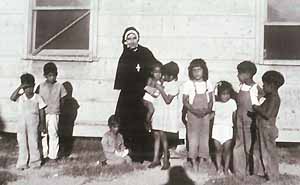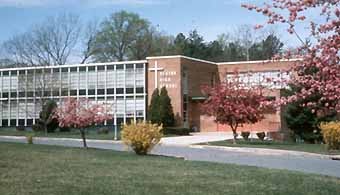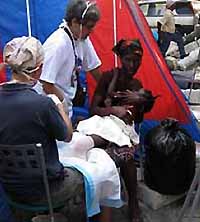We RJM in the United States now form one province, but once we were three provinces. We are a tapestry woven of many cultures, a province with origins in Europe, French Canada, and Mexico. Since 1997, our province has grown to include the island nation of Haiti.
Beginnings
Claudine Thévenet was born in Lyon, France on March 30th, 1774. During the French Revolution, she witnessed the execution of her two brothers, and was moved to re-discover the existence of a good God.
Claudine, together with other young women, began a clandestine apostolate aimed at relieving the sufferings of the persecuted and binging God into their lives.
On the night between the 5th and 6th of October, 1818, Claudine left her home accompanied by an orphan, a worker and a loom for weaving silk. She was not aware that this humble beginning would become the Congregation of the Religious of Jesus and Mary.
Claudine’s principal objective was education, with a clear preference for the young and unfortunate. Her methods were based on love, goodness, and attention to each person. This spirit would permeate the works of Claudine’s daughters and would be carried out to various parts of the world.
After Claudine’s death, the Religious of Jesus and Mary embarked on apostolic endeavors to make Jesus and Mary known and loved.
The New World
In 1855, the administrator of the diocese of Quebec received a petition from a number of parish priests and parents begging him to bring French nuns to educate Canadian girls. His emissary in France journeyed to Lyon to present this request. As a result, eight Religious of Jesus and Mary set sail for Canada.
By the middle of the 19th century, a current of emigration began from Canada to the United States. Some years of bad harvests made the Canadian farmers fear that their cultivation of the soil would no longer support them. Attracted by the hope of more abundant gains offered in the industrial towns of America, they settled in the new land. This movement was disturbing for the Catholic bishops because the new dioceses did not have enough missionaries to cope with the religious needs of the immigrants. Experience had shown that unless the people kept their native language they easily fell away from the faith of their forefathers. Some Canadian priests went to the new mission-field to found the first French Canadian parishes in the United States. These pastors sought the help of religious sisters to educate the children of the immigrants who had come to work in the mills.
Click here to learn about the 200th anniversary of our congregation’s founding.



